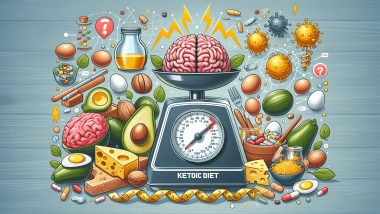In today’s fast-paced world, it’s easy to overlook the importance of micronutrients in maintaining our overall health. We often prioritize macronutrients such as carbohydrates, proteins, and fats, forgetting that vitamins, minerals, and trace elements play a vital role in our well-being. These tiny but mighty substances are essential for various bodily functions, supporting everything from immune system function to bone health. By understanding the role of micronutrients in our health, we can make informed choices about our diet and ensure we’re giving our bodies the essential nutrients they need to thrive.
Introduction to Micronutrients
Definition of Micronutrients
Micronutrients are essential nutrients that our bodies require in small amounts to maintain proper health and function. They include vitamins, minerals, and trace elements, which play vital roles in various bodily processes.
Difference between Micronutrients and Macronutrients
Micronutrients are often contrasted with macronutrients, which are nutrients required in larger quantities. While macronutrients provide the energy needed for bodily functions, micronutrients are necessary for the proper functioning of metabolism, growth, and development.
Types of Micronutrients
There are three main types of micronutrients: vitamins, minerals, and trace elements. Each type has its own unique functions and benefits that contribute to overall health and well-being.
Role of Vitamins
Overview of Vitamins
Vitamins are organic compounds that are essential for normal growth, development, and metabolic processes in the body. They are classified into two categories: fat-soluble vitamins (A, D, E, and K) and water-soluble vitamins (B vitamins and vitamin C).
Fat-Soluble Vitamins
Fat-soluble vitamins are stored in the body’s fatty tissues and can be utilized when needed. Vitamin A supports vision, immune function, and cell growth. Vitamin D is crucial for bone health, as it aids in the absorption of calcium. Vitamin E acts as an antioxidant, protecting cells from damage, while vitamin K plays a vital role in blood clotting.
Water-Soluble Vitamins
Water-soluble vitamins cannot be stored by the body and are excreted through urine, so regular intake is necessary. The B vitamins (thiamine, riboflavin, niacin, pantothenic acid, pyridoxine, biotin, folate, and cobalamin) are involved in energy production, cell metabolism, and the formation of red blood cells. Vitamin C supports immune function, collagen synthesis, and acts as an antioxidant.
Functions and Benefits of Each Vitamin
Each vitamin has specific functions and benefits. Vitamin A helps maintain healthy vision, skin, and immune function. Vitamin D supports bone health and calcium absorption. Vitamin E acts as an antioxidant, protecting cells from damage. Vitamin K plays a crucial role in blood clotting. B vitamins aid in energy production and metabolism, while vitamin C supports immune function and collagen synthesis.
Role of Minerals
Overview of Minerals
Minerals are inorganic substances that are essential for various bodily functions, including the formation of bones and teeth, regulation of fluid balance, and maintenance of nerve function. There are two main categories of minerals: major minerals and trace minerals.
Major Minerals
Major minerals are required in larger amounts by the body. These include calcium, phosphorus, potassium, sodium, magnesium, and sulfur. Calcium and phosphorus are vital for bone and teeth health. Potassium and sodium are important for fluid balance and nerve function. Magnesium is involved in muscle and nerve function, while sulfur is a component of certain amino acids and vitamins.
Trace Minerals
Trace minerals are needed in smaller amounts by the body, but they are still crucial for proper bodily functions. Examples of trace minerals include iron, zinc, copper, manganese, iodine, selenium, and chromium. Iron is necessary for oxygen transport and energy production. Zinc supports immune function, wound healing, and DNA synthesis. Copper is involved in the production of red blood cells. Manganese plays a role in bone formation and metabolism. Iodine is essential for thyroid hormone production, and selenium acts as an antioxidant. Chromium helps regulate blood sugar levels.
Functions and Benefits of Each Mineral
Each mineral has its own specific functions and benefits. Calcium and phosphorus promote bone and teeth health. Potassium and sodium help maintain fluid balance and nerve function. Magnesium supports muscle and nerve function, while sulfur is important for protein synthesis. Iron aids in oxygen transport and energy production. Zinc supports immune function and wound healing. Copper is involved in red blood cell production. Manganese helps with bone formation and metabolism. Iodine is essential for proper thyroid function. Selenium acts as an antioxidant, and chromium helps regulate blood sugar levels.
Importance of Trace Elements
Definition and Examples of Trace Elements
Trace elements, also known as trace minerals, are minerals required by the body in very small amounts. These include elements such as iron, zinc, copper, iodine, selenium, and chromium.
Crucial Roles of Trace Elements in the Body
Although needed in trace amounts, these elements play crucial roles in various bodily processes. Iron is necessary for oxygen transport and energy production. Zinc is involved in immune function, growth, and development. Copper contributes to the production of red blood cells. Iodine is essential for thyroid hormone synthesis. Selenium acts as an antioxidant, protecting cells from damage. Chromium helps regulate blood sugar levels.
Sources and Recommended Intake of Trace Elements
Trace elements can be obtained through a well-balanced diet that includes a variety of foods. Iron can be found in meat, poultry, and legumes. Zinc is abundant in seafood, red meat, and whole grains. Copper can be obtained from nuts, seeds, and shellfish. Iodine is found in iodized salt and seafood. Selenium is present in nuts, seafood, and grains, while chromium can be obtained from broccoli, whole grains, and certain spices. The recommended intake of trace elements varies depending on age, gender, and specific needs. It is important to consult with a healthcare professional for personalized recommendations.

Micronutrients and Immune Health
Boosting the Immune System with Micronutrients
Micronutrients play a crucial role in supporting a healthy immune system. They help regulate and strengthen the immune response, making the body better equipped to fight off pathogens and infections.
Vitamins and Minerals for Immune Support
Certain vitamins and minerals have shown to have significant effects on immune health. Vitamin C, found in citrus fruits and leafy green vegetables, is well-known for its immune-boosting properties. It helps stimulate the production of white blood cells and antibodies. Vitamin D, obtained through sun exposure and certain foods, plays a role in regulating immune function. Zinc, found in oysters, meat, and whole grains, supports immune cell function and helps prevent infections.
Research on Micronutrients and Immunity
Numerous studies have explored the relationship between micronutrients and immune function. Vitamin C has been shown to reduce the duration and severity of the common cold. Vitamin D deficiency has been associated with an increased risk of respiratory infections. Zinc supplementation has been found to reduce the duration and severity of diarrhea in children. Further research is ongoing to better understand the intricate relationship between micronutrients and immune health.
Micronutrients and Energy Production
Vitamins and Minerals Involved in Energy Metabolism
Micronutrients are essential for energy production in the body. B vitamins, including thiamine, riboflavin, niacin, and biotin, are necessary for converting macronutrients into usable energy. Magnesium is involved in the production of ATP, the body’s main energy molecule.
Role of Micronutrients in ATP Production
ATP (adenosine triphosphate) is the primary energy currency of the body. Many micronutrients, including B vitamins and magnesium, play a vital role in the production and utilization of ATP. They are necessary in various enzymatic reactions that occur during energy metabolism.
Effects of Micronutrient Deficiencies on Energy Levels
Deficiencies in micronutrients can result in decreased energy levels and fatigue. Without adequate amounts of B vitamins and magnesium, the body may struggle to produce enough ATP. This can lead to a lack of energy, poor concentration, and reduced overall performance. Ensuring an adequate intake of these micronutrients is essential for maintaining optimal energy levels.
Micronutrients and Growth & Development
Micronutrients for Proper Growth and Development
Micronutrients are essential for healthy growth and development, particularly during childhood and adolescence. They support the development of organs, tissues, and bones, as well as cognitive function.
Vitamins and Minerals for Children and Adolescents
Children and adolescents have specific micronutrient needs to support their rapid growth and development. Adequate intake of vitamins A, C, and D is crucial for bone growth and immune function. Calcium and phosphorus are essential for bone health. Iron is necessary for proper cognitive function and preventing iron-deficiency anemia.
Prenatal and Postnatal Micronutrient Needs
During pregnancy and lactation, a woman’s nutrient needs increase significantly. Micronutrients such as folate, iron, and calcium are of particular importance during these periods. Adequate intake of these nutrients is vital for the healthy development of the fetus and the well-being of the mother.

Micronutrients and Cognitive Function
Brain Health and Micronutrient Status
Micronutrients play a significant role in maintaining optimal brain health and cognitive function. They support neurotransmitter production, protect against oxidative stress, and contribute to overall brain development.
Vitamins and Minerals for Cognitive Function
Certain vitamins and minerals have been linked to improved cognitive function. B vitamins, particularly folate, vitamin B6, and vitamin B12, are essential for the synthesis of neurotransmitters and DNA. Vitamin E, an antioxidant, helps protect brain cells from oxidative damage. Omega-3 fatty acids, although not a micronutrient, have been shown to support brain health and cognitive function.
Role of Micronutrients in Neurotransmitter Production
Neurotransmitters are chemical messengers that play a crucial role in transmitting signals between neurons in the brain. Micronutrients, particularly B vitamins and essential minerals like magnesium and zinc, are necessary for the production and regulation of neurotransmitters. Ensuring an adequate intake of these micronutrients can support optimal cognitive function and overall brain health.
Micronutrients and Bone Health
Minerals Essential for Bone Health
Micronutrients are vital for maintaining strong and healthy bones. Calcium and phosphorus are major minerals necessary for bone formation and maintenance. They provide the structural components needed for strong bones and teeth.
Vitamins for Calcium Absorption and Bone Density
Vitamins also play a crucial role in bone health. Vitamin D is necessary for the absorption of calcium from the diet and its utilization in bone formation. Without sufficient vitamin D, calcium cannot be efficiently absorbed and utilized, leading to weakened bones and increased risk of fractures. Vitamin K is another important vitamin for bone health, as it contributes to the production of proteins involved in bone mineralization.
Preventing Osteoporosis through Micronutrient Intake
Osteoporosis, a condition characterized by weakened and brittle bones, is a significant concern, especially in older adults. Adequate intake of calcium, phosphorus, vitamin D, and vitamin K from a young age can help build and maintain strong bones, reducing the risk of osteoporosis later in life.
Micronutrients and Disease Prevention
Reducing the Risk of Chronic Diseases with Micronutrients
Micronutrients, especially vitamins and antioxidants, play a crucial role in reducing the risk of chronic diseases. They help protect against cellular damage and oxidative stress, which are underlying factors in many chronic conditions.
Antioxidants and Their Protective Effects
Antioxidants are substances that neutralize harmful free radicals in the body. Free radicals are highly reactive molecules that can damage cells and contribute to the development of chronic diseases. Micronutrients such as vitamins C, E, and A, as well as minerals like selenium and zinc, act as antioxidants and help prevent or reduce the severity of diseases caused by oxidative stress.
Micronutrients for Heart Health, Cancer Prevention, etc.
Micronutrients have been studied extensively for their potential role in preventing and managing various chronic diseases. For example, vitamin E and selenium may have protective effects against heart disease. Antioxidants, including vitamins C and A, may reduce the risk of certain types of cancer. The regular intake of a varied and balanced diet rich in micronutrients can contribute to overall disease prevention and promote a healthier life.
Understanding the role of micronutrients in our health is essential for maintaining optimal well-being. By ensuring a balanced and varied diet that includes a wide array of vitamins, minerals, and trace elements, you can support your immune system, energy production, growth and development, cognitive function, bone health, and reduce the risk of chronic diseases. Remember to consult with a healthcare professional for personalized recommendations based on your specific needs and circumstances. By prioritizing your intake of micronutrients, you are investing in your long-term health and well-being.


